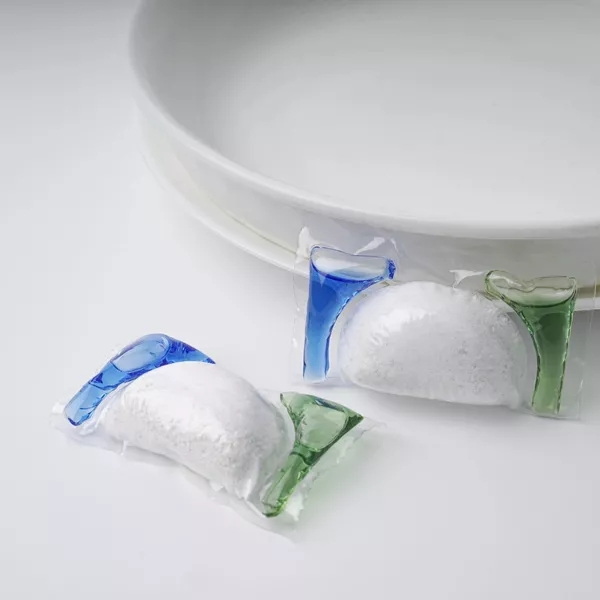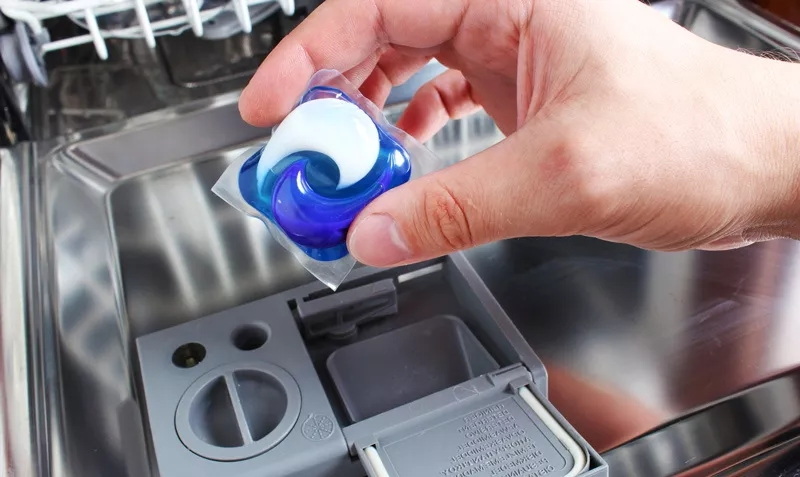Dongguan UFine Daily Chemical Co.,Ltd.
- All
- Product Name
- Product Keyword
- Product Model
- Product Summary
- Product Description
- Multi Field Search
Views: 222 Author: Tomorrow Publish Time: 10-17-2025 Origin: Site











Content Menu
● Understanding Dishwasher Pods
● Why You Might Run Out of Dishwasher Pods
● Household Alternatives to Dishwasher Pods
>> 1. Dishwasher Detergent Powder or Liquid
>> 3. Borax
>> 5. Dishwashing Liquid (Manual)
>> 6. Homemade Dishwasher Detergent
● How to Use Alternatives Safely in Your Dishwasher
● Additional Tips for When You Are Out of Pods
● Benefits of Alternatives to Dishwasher Pods
● When Commercial Pods Are Better
● Summary of Dishwasher Pod Alternatives
● FAQ
>> 1. Can I use baking soda alone instead of dishwasher pods?
>> 2. Is white vinegar safe for dishwashers?
>> 3. Can I use regular dish soap in a dishwasher?
>> 4. How do I make my own dishwasher detergent?
>> 5. Will these alternatives damage my dishwasher?
Dishwasher pods have become a kitchen staple for effortless and efficient dishwashing. However, running out of these convenient pods can be frustrating, especially when you have dirty dishes piling up. If you find yourself without dishwasher pods, there are several alternatives you can use. This article will explore various substitutes you can use in your dishwasher, explain how to use them effectively, and offer tips for maintaining dishwasher performance without commercial pods. Whether you're looking for natural solutions, household items, or DIY recipes, this guide will help you keep your dishes sparkling clean until you can restock your pods.

Dishwasher pods are pre-measured packets containing detergent and sometimes rinse aid and other cleaning agents. They simplify the dishwashing process by eliminating measuring and reduce waste. Pods combine cleaning power with convenience, but they are not the only way to achieve clean dishes.
Several factors contribute to running out of dishwasher pods:
- Forgetting to restock on time.
- Supply shortages or delivery delays.
- Cost concerns leading to attempts to stretch supplies.
- Sudden increased dishwashing needs.
Running out does not mean your dishes must sit waiting for a cleaning solution. Alternatives exist that can match or even exceed pods in cleaning efficacy if used properly.
You can use several common household products as substitutes for dishwasher pods. These options vary in cleaning power and safety for your dishwasher, so always check your machine's manual before trying any new cleaning agent.
If you have dishwasher detergent powder or liquid available, use the recommended amount in your detergent compartment. These are specially formulated for dishwashers and can clean effectively like pods.
Baking soda is excellent for removing grease and odors. Use about one tablespoon of baking soda in the detergent slot. It may not cut through tough food residues but works well combined with other agents. Baking soda also softens water, which can improve cleaning efficiency.
Borax is a natural mineral-based cleaner often used in laundry. Using a tablespoon of borax in your detergent slot helps brighten dishes and remove stains. It also has antibacterial properties that enhance sanitization. It pairs well with baking soda or vinegar to boost cleaning performance.
White vinegar is known for its grease-cutting and deodorizing properties. Pour half a cup in the bottom of your dishwasher or in the rinse aid compartment. Do not put vinegar directly into the detergent compartment as it's not a detergent but enhances cleaning. Vinegar can help remove hard water deposits and boost shine. It is a great way to maintain a dishwasher's interior cleanliness as well.
Using regular dish soap meant for hand washing dishes is generally NOT recommended because it produces excessive suds and may damage your machine. However, in extreme cases, a very small quantity (a few drops) mixed with water can be used cautiously. Make sure to rinse the machine thoroughly afterward to prevent overflow. Avoid any soaps with additives like lotion or antibacterial agents.
You can also make your own detergent by mixing the following ingredients:
- 1 cup baking soda
- 1 cup washing soda
- 1/2 cup citric acid
- 1/2 cup salt
Mix well and use about one tablespoon per load. Citric acid helps remove hard water spots and boost cleaning. This homemade detergent is powerful, environmentally friendly, and free from unnecessary chemicals.

- Always place powder or liquid substitutes in the detergent compartment.
- Do not overuse substitute agents to avoid residue or damage. Excess baking soda or borax can leave residue on dishes or inside the machine.
- Avoid household soaps that foam excessively.
- Run a rinse cycle with plain water after using non-commercial detergents to clear any lingering substances.
- For vinegar use, avoid mixing with bleach or harsh chemicals to prevent toxic fumes.
- Pre-rinse heavily soiled dishes: Removing large food particles helps detergents work more effectively and prevents drain clogs.
- Use a hot water cycle: Hot water improves detergent solubility and dissolves grease better.
- Check your dishwasher filter regularly and clean it: A clogged filter reduces cleaning efficiency.
- Use a rinse aid (commercial or vinegar): This reduces spots and speeds drying.
- Run a dishwasher cleaning cycle monthly: Use a dishwasher cleaner or vinegar to remove buildup and keep the machine fresh.
Certain substances can damage your dishwasher or void warranties. Avoid using:
- Regular dish soap in large quantities, which can cause foam overflow and damage.
- Bleach or acidic substances in excess, which may corrode parts.
- Oil-based cleaners or harsh chemicals not designed for dishwashers.
Always test alternatives cautiously and follow manufacturer guidelines to keep your dishwasher in proper working order.
- Cost-effective: Household alternatives and homemade detergents are often cheaper than commercial pods.
- Environmentally friendly: Natural ingredients like baking soda and vinegar reduce chemical pollution.
- Use readily available household items: There's no need to wait for delivery.
- Flexibility for emergency use: Perfect for times when you forget to buy pods or are in remote locations.
While alternatives work well in a pinch, commercial pods are specially formulated to optimize detergent composition and rinse aids in every load. For tough grime, grease, or to save time, pods provide consistent and reliable cleaning. The convenience and precise dosage reduce detergent wastage and minimize dishwasher wear.
| Alternative | Usage | Benefits | Cautions |
|---|---|---|---|
| Dishwasher detergent (powder/liquid) | Use recommended dose | Strong cleaning, dishwasher safe | None if used properly |
| Baking soda | 1 tablespoon per load | Deodorizes, gentle cleaner | Less effective on grease |
| Borax | 1 tablespoon per load | Brightens, stain removal | Use properly, avoid large amounts |
| White vinegar | ½ cup in rinse aid or bottom | Cuts grease, rinse aid | Not detergent, avoid detergent slot |
| Small dish soap amount | Few drops mixed with water | Emergency option | Produces suds, risk of overflow |
| Homemade detergent | 1 tablespoon per load | Natural, cost-efficient | Requires proper mix |
Running out of dishwasher pods does not mean you are out of options. Many household items and homemade recipes can effectively clean your dishes and keep your dishwasher functioning well in the short term. Baking soda, borax, white vinegar, or specialized dishwasher detergents can serve as reliable substitutes if used with care. Always follow safe practices to protect your dishwasher and avoid damage caused by improper cleaning agents. With these alternatives, you can maintain clean, spotless dishes until you replenish your dishwasher pods.

Baking soda is helpful for deodorizing and light cleaning but lacks the strong detergents needed for greasy or heavily soiled dishes. It works better combined with other cleaning agents.
Yes, white vinegar is safe when used as a rinse aid or in the bottom of the dishwasher but should not replace detergent in the detergent compartment.
Regular dish soap creates excessive suds and is generally not recommended. Only use a very small amount in emergencies and rinse the dishwasher well afterward.
You can mix baking soda, washing soda, citric acid, and salt. Use about one tablespoon per load for effective cleaning.
When used correctly and in moderation, alternatives like baking soda, vinegar, and borax are safe. Avoid excess soap or harsh chemicals that can cause damage or void warranties.